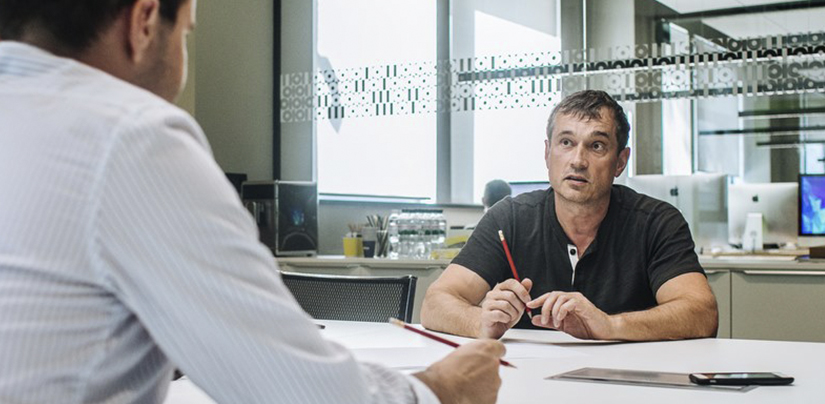“About $50 million has already been invested in UNIT.City. Total costs are estimated at $700-800 million” – an interview with Vasyl Khmelnytsky
13 July, 2018
Vasyl Khmelnytsky heads the investment company UFuture. One of his businesses is the innovation park UNIT.City whose founder and investor he is. Today it is the only facility of its kind in Ukraine that is working, though, Khmelnytsky says, this is just the beginning: the first phase is to end next spring, and the entire project is scheduled to be over by 2025.
CEO of AIN.UA Ilya Boshnyakov and Editor-in-Chief of AIN.UA Illya Kabachynskyi have met with Vasyl Khmelnytsky a few days after the opening of the second building on the site to talk about the economy paradigm of the entire project: how much money has been invested in UNIT.City as of now, how much will be spent when the construction of residential estates begins and what an innovative “city in the city” will be able to offer to its residents. Khmelnytsky willingly talks about what has already been implemented, and what he wants to do, but he always mentions: all this will happen if there is demand. He does not want to look too far ahead and explicitly states: “I do not like to promote myself based on what does not exist.”
During the conversation Khmelnytsky is open and feels at ease answering all questions: about Bionic Hill, financial issues and potential competitors. He has come for the interview immediately after another meeting and used an old joke not to take the offer of coffee or water, with a smile on his face: “I’ve not earned this today yet.”
Are you happy with the new building?
I’m always unhappy with something. But this is movement forward: you check what does not work and what could be done better. But in general its mark is good.
Was everything launched on time?
There was a little delay. We hired good architects, but not workers. But we did everything the right way, and cooperation turned out perfectly. Our plan is that the entire project should be over by 2025.
Do you think you will manage to meet the deadline?
The question is tricky. How do you think – will you buy a house in the Canaries in 10 years? If there is money, then why not, right? The same is here – now we are building as demand is high. And if it continues to be higher than the supply, then we will continue building actively. We have been building Novopecherski Lypki for 15 years already. Not because we cannot build 300,000 square meters at once. We see that about 300 apartments are sold per year. Therefore, we build about 320 apartments every year. There is no point in building 500 apartments, because demand is much lower, and construction means money.
Is that right to say that when you have tenants for a third block, you begin building it, when for a fourth one –you are building the fourth?
That’s right, that’s how it virtually works. We see demand – we actively build. Currently, we’ve got a request for several new buildings at once, thus a couple of construction sites are now working simultaneously.
And what if there are no tenants for a fifth building?
We will be building it, but slowly. In the end, it will be sold out. But the sixth and seventh buildings will be commissioned after demand increases.
Do I get it right that there are already tenants for the new buildings?
Yes, you do. Two buildings in UNIT.City are almost ready, and 75% of the area in each has already been rented out. This is an excellent result for the local market. As a rule, this process takes two years for buildings in Ukraine.
We have a building that we are building with KAN Development 50/50, it’s about 12,000 square meters. It was completely rented it out when they were building its third floor.
And how about housing, which is also part of the project? Will it begin to be built according to plan?
Well, one cannot plan far ahead in our world, so – no. We have a strategy to develop UNIT.City. But something can happen tomorrow, for example, the political situation in the country will change, and our entire strategy will be ruined. Further actions may change. Therefore, I do not look too ahead. The company is capable of building residential estates here within two or five years – everything will depend on demand.
How do you feel whether there is enough demand?
Demand exists for unique facilities. In general, a lot of residential buildings are built in Kyiv, but demand for such housing is small, as people do not get richer. They need to grow rich to buy a flat. However, unique facilities will always be in demand: let’s take Novopecherski Lypki – there have been buyers for many years. The same is with UNIT.City – it is a unique project.
Is it unique because it is a “city in the city”?
We plan to sell these apartments only to people who are related to innovations. Of course, this is a kind of limitation for us. But I do not want people who let’s say are engaged in off-the-books cash or coal business, or government officials to buy flats here.
I’m sorry, but it sounds a little snobbish. In addition, in Ukraine there are many IT companies who work not in a quite honest way and resort to the same off-the-books cash services. You will not check each and every one, will you?
We’ve built and sold about 3 million square meters, and we are a little familiar with this market. And we’re not going to debate whether it turns to be a success or not. This is a new idea, we want to try to make it reality: to sell apartments only to the people who promote innovations. When they go out for a walk here in the evening, they will start discussing something and can jointly come up with a brilliant idea. We see a blue ocean in it: we create an environment where one success story builds on another. This is an experiment.
And do you believe in this experiment?
We already have the experience of our first building. The companies that rent offices there have implemented at total of 20 joint projects. They have grown by an average of 50%. And imagine there will be 500 such companies and thousands of people around them. Therefore, yes, I do believe in it.
How successful are all these projects?
We’ll see. I’ll give you an example. I’ve been to WeWork. Their passages in corridors were originally 1.6 meters wide, it was for convenience. But recently, they narrowed them to one meter. What for? For people to collide, talk, discuss ideas, etc. We used to fear that people would stop going to business centers and will have home offices. But as practice shows, the community disciplines a person and encourages him or her to succeed.
If we talk about people from the IT sector, their average income is $20,000-40,000 a year. Can they afford an apartment here?
Why not? It’s not that cheap in Novopecherski Lypki. Yes, a square meter there costs more than $2,000, it will be $1,500 here. A 50-square-meter apartment will cost $75,000. I can give you an installment plan for four years, you will pay $20,000 per year.
As you focus on UNIT.City, is it correct to say that the Bionic Hill project outside Kyiv is closed?
Does it happen to you when you fail and then look back and think it is actually good that it failed? I’ve got such feelings with Bionic Hill. Every year I visit the Hill and see that young people do not want to travel far away to work campuses, although there are comfortable shuttle buses. Therefore, an innovation park needs to be in the city, closer to infrastructure. If the Bionic Hill had been a greenfield project, it would be more difficult to attract residents. I see this now. To cut a long story short – yes, the Bionic Hill is closed.
Is UNIT.City the Bionic Hill in a way?
Yes, only an improved model and less risky. It is difficult to build a city outside the city.
Once you told Forbes in 2014 that your core activity now is a development business. Is UNIT.City a development business for you? Or how do you see it?
My main areas of activity today are renewable energy, innovation, industry and education under a one umbrella brand – the UFuture investment group.
One thing that tells us from others is that we do not just build buildings. Therefore it is correct to say that UNIT.City is a large infrastructure facility focusing on innovation and education, where there will be an institute, a school, a kindergarten, restaurants, safety and so on.
Is innovation here seen as added value?
Yes, to sell an apartment at a higher price, to rent property at a higher rate. In fact, we give not just a table and a chair. I’m sometimes told that it’s a bit expensive here. Yes, you can have the price lower by $2 per square meter somewhere, but there are students, a school, universities, other companies, educational programs, accelerators, laboratories, security and so on. If you see no point in that, then why spend $2 more? But the advantages provided by UNIT.City will allow you to become better, that is why the price is higher.
You mentioned the word “university,” but there is a school so far. What will it be?
The point at issue is the educational environment in general. For example, DTEK University will move here soon, their base is quite strong. We will expand our educational initiative, UNIT Factory, to bring the total number of students to 2,500 people. We are working on a new strong Ukrainian program.
We want to invite as many high-quality educational institutions here as possible and are ready to offer them favorable conditions. For example, we are now in talks with an English language school from the West. My rent rate will be price at cost to make them interested. After all, it’s difficult to become successful without English today. If you have a good educational project – come to us, we will give you good conditions.
Do you plan to build housing for students?
These are only plans so far, but they exist. Here we have a building where we think to create something like a dormitory, as there are talented students who are from small towns and they cannot afford to rent expensive housing. We cannot provide rooms to them completely free of charge, but there is an idea of lending at a very low interest – about 5%. With education from us and further employment, they will be able to get money back, living a comfortable life.
You have no fee at your school. Will you introduce a fee for education, as even in the United States, where you often go, everyone pays for education?
As I’ve seen from experience, talented people often do not have high income. Having fixed a real tuition price at the school, I can gather children of rich parents, but they will have no motivation and desire. Having created equal opportunities, I could attract those who are really motivated to learn. Then these students will go to work for companies that are UNIT.City’s residents, they will create their own projects. So, they will rent more, buy apartments, and so on. The business model here is the following: I’m not afraid of costs much, as I see the future income from the whole system. It’s a game in the long run, and the money will not come immediately, but in a few years.
Will resident companies of UNIT.City have priority access to students from your school?
Of course, they will. But another thing is that a student may not want to go to work for that company. For example, if they are offered a low salary or poor conditions. Nobody will push them and they can go to any other company that is not a resident.
There is no secret that you often work on projects in partnership. Who is your partner in UNIT.City?
Yes, that’s true: I usually work with partners. But this time I do everything for the most part by myself.
Is Andriy Ivanov [a longtime partner Khmelnytsky] not with you?
No, he is not in the project either.
Why did it happen that you are doing everything on your own?
The fact is that UNIT.City is a very long-term project. At the beginning, we will only be investing. Return on investment will start in a few years. I am sure that we need an international partner for this project. We therefore initially do everything according to international standards: both in terms of construction, and in terms of financing – audits are conducted by international firms. When the project is at that stage that it could be showcased to Western investors – I hope this will happens this autumn – we’ll start looking for partners.
In Ukraine, we partner with investors only for individual buildings. For example, one building is being built 50/ 50 with Igor Nikonov from KAN Development.
Maksym Bakhmetov once said in an interview that he has “a share in every square meter.” Is this true?
Yes. Managing partners have a small share. So they are more responsible at work. I often practice this in business.
And what about your UNIT.City in Lviv? And how is Kharkiv going on?
They have begun to build in Lviv, at the stage of ground work. We get a loan – build the first 12,000 square meters. In fact, this will be another UNIT.City. In Kharkiv, there are only preparations.
A question about competition. The creation of a big innovation park, Innovation District IT Park, in Lviv has been announced. Will you compete for residents with it?
I support the idea that every such a project works for Ukraine’s benefit. It’s good when there are many such cities. Therefore, I do not look at it as competition. For my part, I would just add that I do not like to promote myself prematurely: let’s see what happens there in the end. I did not want to show UNIT.City before next spring, until the first part has been built, but a strong team came and insisted that we already had what to show.
Why are there no such projects in Dnipro, Odesa, for example?
First, the model is new, so we decided to limit ourselves to several cities. Many people live in Kharkiv; there are many IT professionals in Lviv – so we chose those two cities. Secondly, UNIT.City is a long story, it requires a lot of investment. We finish what we have in the pipeline now, and we will plan further.
And how much have you already invested in UNIT.City?
About $50 million. This is together with the purchase of the plant where UNIT.City is located.
What is your estimate for all the projects?
I think it’s about $700-800 million, but as further financing will be at the expense of rental income and the sale of housing, we should invest about $200 million at the start.
If you are offered a good price for UNIT.City, are you ready to sell it?
Once I was asked one good question: “Do you collect real estate or do you do business?” I do business. Therefore, if there is a good price, I will sell it.
What is the good price?
I think this will be our EBITDA with a multiplier of 5-6. Much depends on the future situation in the country, but this is the current figure.
Do not plan to invest in start-ups?
It’s interesting that many people really come to me with their ideas, because they think: “Oh, he has UNIT.City, therefore, he invests in start-ups.” At this stage, I do not invest in start-ups, I do not plan to create my IT companies – I do not want to become a competitor for local residents, because it can cause a conflict of interest.
Do you have a stake in an IT company outside of UNIT.City?
No, I don’t.
This question appeared for the following reason. Earlier, K.Fund worked with TCDC. At what stage is this cooperation now? And how was it then at all?
We signed a contract, according to which they helped us to attract start-ups for UNIT.City, conducted training, etc. It was not an investment. The contract expired and we did not renew it.
News reports repeatedly mentioned that UNIT.City will somehow help with a Hyperloop project in Ukraine. Can you give details about this cooperation?
If this project is implemented, we can offer our start-ups for it – that’s all. We are not the founders of the project and do not finance it.
While talking with you, we get the impression that you know absolutely everything about each of the projects. Are you a fan of micromanagement?
Absolutely not. I’m just sure that if you are doing something, you should know every detail. Plus, I’m interested in everything and I want to know as much as possible.








